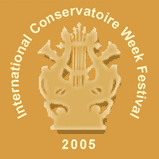
|
|||
 |
|||
 |
|
ST. PETERSBURG RIMSKY-KORSAKOV STATE CONSERVATOIRE |
|
The Conservatoire was opened thanks to the endeavours of a group of Russia’s progressive musicians and edu cators. The most signifi cant figure in the group was renowned pianist and composer, Anton Rubinstein. The finest artistic for ces of Russia along with famous European musicians were invited to teach at the Conservatoire — the violinist H. Wieniawski, the harpist À. Tzabel, the flutist P. Ciardi, to name but a few. P.I.Tchaikovsky was among the Conservatoire’s first graduates in 1865. Vocalists F. Stravinsky, V. Zarudnaya, I. Ershov, pianists V. Safonov, M. Barinova, F. Blumenfeld, violinists J. Heifetz, E. Tzimbalist, M. Vaiman, composers A. Lyadov, S. Prokofiev, D. Shostakovich and many others were affiliated with the conservatoire. The performance and teaching schools that developed at the Conservatoire played a significant role in the musical life of Russia, including the piano school of T. Leschetizky and A. Yesipova, the violin school of L. Auer, the cello school of K. Davidov and A. Verzhbilovich, and the vocal school of H. Nissen-Saloman and E. Everardi. St. Petersburg’s school of composition headed by N. Rimsky-Korsakov has impacted the development of world music up to the present day in unprecedented fashion. In the 1920’s a special music school and music college were opened and added to the Conservatoire. The country’s first educational centre for musical theatre was opened in the Conservatoire under the title of Opera Studio. Today the St. Petersburg Conservatoire prizes its distinguished
staff whose achievements in academic studies, performance and creative
fields are widely recognized. All the leading performers from the
city’s Philharmonic, theatres and artistic associations are professors
of the Conservatoire. Both orchestras of the St. Petersburg Philharmonic,
the orchestras of the Mariinsky and Mussorgsky Opera and Ballet
Theatres, the choir and orchestra of the Academic Capella as well
as other local orchestras consist mainly of the Conservatoire’s
alumni. The St. Petersburg Conservatoire is a prestigious Russian
educational establishment and ranks among the The Conservatoire takes pride in its historic main building erected in 1896, the Opera and Ballet Theatre (formerly the Opera Studio), and the impressive Glazunov Hall which because of its unique historicarchitec tural value and excellent acoustics is considered one of the best chamber music halls in Europe.
|



 The
history of the St. Petersburg The history of the St. Petersburg
State Conservatoire, the first higher music education institution
in Russia, was founded on the 20th of September 1862.
The
history of the St. Petersburg The history of the St. Petersburg
State Conservatoire, the first higher music education institution
in Russia, was founded on the 20th of September 1862.